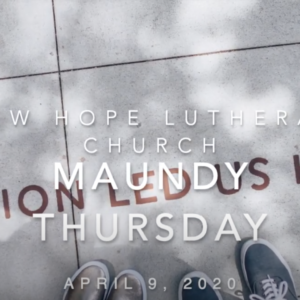John 13:1-17, 31b-35
1 Now before the festival of the Passover, Jesus knew that his hour had come to depart from this world and go to God. Having loved his own who were in the world, Jesus loved them to the end.
2 The tempter had already put it into the heart of Judas son of Simon Iscariot to betray Jesus. And during supper 3 Jesus, knowing that God had given all things into his hands and that he had come from God and was going to God, 4 got up from the table, took off his outer robe, and tied a towel around himself. 5 Then Jesus poured water into a basin and began to wash the disciples’ feet and to wipe them with the towel that was tied around him. 6 He came to Simon Peter, who said to him, “Lord, are you going to wash my feet?” 7 Jesus answered, “You do not know now what I am doing, but later you will understand.” 8 Peter said to Jesus, “You will never wash my feet.” Jesus answered, “Unless I wash you, you have no share with me.” 9 Simon Peter said to him, “Lord, not my feet only but also my hands and my head!” 10 Jesus said to him, “One who has bathed does not need to wash, except for the feet, but is entirely clean. And you are clean, though not all of you.” 11 For Jesus knew who was to betray him; for this reason, he said, “Not all of you are clean.”
12 After Jesus had washed their feet, had put on his robe, and had returned to the table, he said to them, “Do you know what I have done to you? 13 You call me Rabbi and Lord—and you are right, for that is what I am. 14 So if I, your Lord and Rabbi, have washed your feet, you also ought to wash one another’s feet. 15 For I have set you an example, that you also should do as I have done to you. 16 Very truly, I tell you, servants are not greater than their master, nor are messengers greater than the one who sent them. 17 If you know these things, you are blessed if you do them.
31b “Now the Son of Man has been glorified, and God has been glorified in the Son of Man. 32 If God has been glorified in the Son, God will also glorify the Son in God’s own self and will glorify the Son at once. 33 Little children, I am with you only a little longer. You will look for me; and as I said to the Judeans so now I say to you, ‘Where I am going, you cannot come.’ 34 “I give you a new commandment, that you love one another. Just as I have loved you, you also should love one another. 35 By this everyone will know that you are my disciples if you have a love for one another.”
—————
Please pray with me this evening, church:
Holy God,
Teach us love again tonight.
In water and washing, show us what love looks like.
Help us receive love.
So that we might be love.
Amen.
—————
This is not how I thought Maundy Thursday was going to go this year…
When we began our Lenten pilgrimage way back at the end of February with Ash Wednesday, this is not where I thought we’d end up. I didn’t envision myself inviting you to gather your family around a meal. I didn’t think that I’d be streaming into your homes on your TVs or iPads or phones. Never in my wildest dreams could I have imagined that I’d be preaching to an empty Sanctuary…
Yet here we are…
A few days ago, on Palm Sunday, I noted that there was going to be some grief associated with Holy Week for me this year. Because I so value the getting together, that gathering, the being in-person…there’s something about the very physical and tactile nature of the worship services of Holy Week that are really difficult to be approximated.
We do our best. And it will be good. It will be excellent.
And through it all, God will be praised. Which is really the only thing that matters.
But still…there’s some sadness in this for me this year.
But…I think this is what love looks like this year.
The stories of Holy Week—the triumphal entry and shouts of “Hosanna!”, the washing of feet and the sharing of a meal, the betrayal, the arrest, the false accusations, the cooked-up fabricated charges, the torture, the shame, the execution—all of these stunning details in this incredibly poignant, magnificently holy story all invite us to examine the question: What does Love look like?
How is love expressed most clearly by God through the person of Jesus, and particularly in the final days of Jesus’ life?
How is it that love is most clearly expressed by God through the betrayal, arrest, crucifixion, and death of Christ?
It’s appropriate that tonight when we hear Jesus’ mandatum novum—the new commandment—“That you love one another, just as I have loved you,” that we take time to reflect on this love in a time of the pandemic.
What does love look like under quarantine?
What does a physically-distant, stay-at-home love look like?
A reflection that’s been making the rounds in clergy circles, but that I heard from Bishop Kevin Strickland, Bishop of the Southeastern Synod of the ELCA, is that this year…this Maundy Thursday in the year of COVID-19…love looks like an empty church.
That is, the most loving thing we could do in a time of pandemic…is stay home.
As much as that pains me. As much as that grieves me. You worshiping from home, me preaching to an empty room…this is the epitome of what love looks like this year.
And, I think it’s awfully close to the kind of serving-others-type of love, what we call this self-giving-type of love, a love that gives of one’s self, that Jesus models here in our gospel this evening. It’s a sacrificial love…a love that sacrifices one’s self…to the benefit of others.
See, the thing is, love isn’t an emotion. We talk about love that way, but it isn’t really. You can’t love passively, or love in theory. You “do” love…you embody love.
Love is an action verb.
I say this in literally almost every wedding sermon I’ve ever preached, love requires something of you. Love is costly. Love always seeks the absolute best for the one being loved…which means that sometimes you’ll have to sacrifice something of yourself for the best of the one whom you love.
And I think we understand this sacrificial love in a very real way this year…as we trudge our way through this pandemic. We’re making choices to keep our distance and stay at home right now not for our own sake…but for the benefit of everyone else, particularly the most vulnerable in our communities. We benefit from these choices, too, absolutely…but the reason we’re staying home and not gathering together is so that we don’t put one another at risk.
Church, this is sacrificial.
I’m reminded of Philippians 2 that we heard read just a few days ago on Sunday: “Let the same mind be in you that was in Christ Jesus.” Right? St. Paul writes about having “the mind of Christ.” And this is what it means to have the mind of Christ…Luther would say, this is what it means to be Christ… Paul goes on, “Let each of you look not to your own self-interest, but to the interests of others. And in all humility, regard others as better than yourselves.”
This is what it means to love like Christ.
And, it’s not as if we don’t care about our own self-interest, but here’s the thing… if each of us looks out for the interests of others, we don’t have to worry so much about our self-interest, because we trust that someone else has our interest at heart. If everyone is looking out for the interests of others, I can look out for your best interest without worrying so much about my own best interest, because I trust that you’re looking out for my best interest. Does that make sense?
This is that sacrificial, self-giving-type of love.
If everyone is looking to the interests of others, we recognize something of what we’re learning from this pandemic, which is that we’re so much more interconnected than we realize. This virus and the ease with which it spreads have laid that bare in a really painful and really terrible way. Our whole lives are wrapped up together. “[C]aught up in a inescapable network of mutuality…tied together in a single garment of destiny…,” as the Reverend Doctor Martin Luther King, Jr. writes.
But if our pain and our suffering is tied up together…so is our healing.
If our hurt and worry and those things that oppress us are tied up together…so is our wellness and our liberation.
Church, this is the sacrificial, self-giving love of Christ.
And this is the kind of love Christ commands of us. “This is my commandment…that you love one another…just as I have loved you…”
Love looks like an empty sanctuary.
Love looks like reaching out with a phone call or a text.
Love looks like offering to grab groceries for your neighbor.
Love looks like sharing a meal together.
Love looks like washing each other’s feet and hands.
This is what love looks like.

